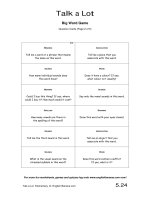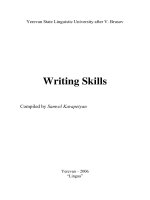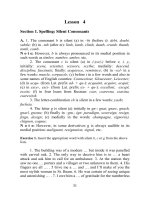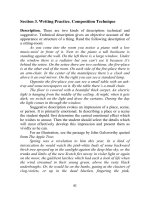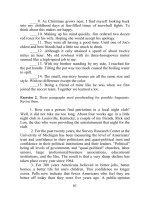Tài liệu Developing writting skills 2 part 8 pdf
Bạn đang xem bản rút gọn của tài liệu. Xem và tải ngay bản đầy đủ của tài liệu tại đây (219.04 KB, 10 trang )
70
writers break down the introductory material into two
paragraphs: the first one introducing the problem and the
thesis and the second one providing additional information
or definitions, and giving background information necessary
for the argument.
2. The essay should offer reasons and support for these reasons.
In other words, the essay should prove its point. It is a good
idea to spend one paragraph on each reason.
3. The essay should refute opposing arguments. Refute means
to prove wrong by argument or to show that something is
wrong. It is this characteristics that is most peculiar to the
argumentative essay than to expository essays. Since there
are two sides to the issue, and since you want to convince the
reader that you are right, not only must you prove your own
case, but you should also prove that the opponent is wrong,
or at least that your points are more valid or significant.
Depending on how many points the writer wishes to address,
the refutation can take from one to three paragraphs.
4. If an opponent does have a valid point, concede that point. It
does little good in an argument to ignore any valid points the
other side may have. You can concede them and then go on
to show that your points are more important anyway.
5. The conclusion should logically follow from the argument.
The conclusion can summarize the main points and reassert
the thesis. In an argumentative essay, however, the
conclusion often makes a demand for some action.
It is not uncommon, however, to see arguments in which
refutation comes before the reasons section.
71
TEXT 1
The Right to Be Let Alone
By Barry Glazer
- How much should the
government interfere in
people’s lives?
- In general, should it interfere,
or not?
1. Government is the instrument of the people, says the United
States Constitution. Those to whom the people entrust power are
charged with maintaining justice, promoting the general welfare, and
securing the blessings of liberty for all of us. Recent newspaper
opinion polls, however, suggest that many Americans are dissatisfied
with the men and women running our communities, our states, and
our nation. More and more of us have come to believe that our
leaders are isolated from the realities ordinary people face. We fear
we are losing control.
2. Instead of helping to alleviate this feeling of impotence,
however, politicians and bureaucrats continue to make and enforce
regulations that constrain our lives and constrict our freedoms. To
help people regain a rightful measure of control, government –
whether national, state or local – should stay out of our private lives
whenever possible. As Supreme Court Justice Louis Brandeis
1
noted,
Americans treasure their “right to be let alone”.
1
Louis Brandeis was associate justice of the United States Supreme Court
(1916-1939). He was a champion of individual rights.
72
3. There is no reason for the government to interfere in our lives if
our behavior does not adversely affect others or if there is no
immediate necessity for such interference. Were I in the throes of
terminal cancer or facing the horror of Alzheimer’s disease, I should
be allowed to kill myself. Faced with the agonizing degeneration of
my memory and personality, I would probably want to end my life in
my own way. But the government says this is illegal. Indeed, were I
to call upon a doctor to assist me on this final quest, she would stand
a good chance of being charged with murder.
4. The government should also stay out of an individual’s life if
there is no reason to believe he is doing wrong. The Bill of Rights
protects us from unlawful searches and seizures. Yet if I drive home
from work in the early morning, I stand a reasonable chance of being
stopped without cause at a police roadblock. While armed, uniformed
officers shine flashlights in my face, I can be subjected to questions
about my destination and point of origin. I can be told to produce my
papers and to step out of my car. I can be made to endure the
embarrassment of performing tricks to prove my sobriety. Allowing
the police such powers is hardly in keeping with our government’s
mission to promote justice, security, and liberty.
5. Finally, the government should refrain from creating
unnecessary burdens for the American people. It should stay out of a
person’s private business if such involvement burdens the individual
unnecessarily or unfairly. Recently, my faithful dog Linda was dying.
Because of years of abuse at the hands of her previous owner, she
was no longer able to walk and had to be carried in my arms. At that
time, the dog warden knocked on my door and threatened me with
fines for my continued refusal to license the animal. When I told him
that Linda was unable to walk, let alone leave my property, he
threatened to return with the police.
6. Similarly, when I wanted to convert my garage into a den, I was
overwhelmed by official red tape. The cost of construction permits
and of measures to meet complex building codes cost more than the
lumber, wall board, and other supplies for the project. Another
example of government red tape became evident when I attempted to
enroll in a Japanese language course at a community college. I was
told the state required that I take a mathematics placement test or pass
a course in elementary algebra first!
73
7. Clearly, government is a necessity. Without it, we would face
anarchy. Yet those who roam the halls of power should remember
from where their power originates and should find ways to reduce the
burden of unnecessary regulations heaped on the backs of the
American people.
Explain what is meant by:
1. Those to whom the people entrust power are charged with
maintaining justice, promoting the general welfare, and
securing the blessings of liberty for all of us.
2. Instead of helping to alleviate this feeling of impotence,
however, politicians and bureaucrats continue to make and
enforce regulations that constrain our lives and constrict our
freedoms.
3. Were I in the throes of terminal cancer or facing the horror
of Alzheimer’s disease, I should be allowed to kill myself.
4. Similarly, when I wanted to convert my garage into a den, I
was overwhelmed by official red tape.
5. Yet those who roam the halls of power should remember
from where their power originates and should find ways to
reduce the burden of unnecessary regulations heaped on the
backs of the American people.
QUESTIONS FOR STUDY AND DISCUSSION
1. How did Glazer build up the introduction of his essay?
Where does it end?
2. Which sentence in this essay best expresses Glazer’s purpose
and central idea?
3. Why does the author mention that Justice Brandeis is the
source of the quotation in paragraph 2 (and of the essay’s
title).
4. Point out the three principles by which the author would
restrict the government’s ability to interfere with people’s
74
lives. Can you think of some other aspects of life to add to
the list?
5. Do you observe any similarity in the structure of the topic
sentences in paragraphs 3, 4 and 5? Discuss the role of if-
clauses?
6. What method of development does Glazer rely on most in
the essay?
7. Find examples of deductive and inductive reasoning in this
essay. (There are two forms of argument: inductive and
deductive. In ‘inductive’ argument, you begin with a general
statement and then produce facts to prove it. In ‘deductive’
argument, you infer one statement from another, beginning
with a general idea and arriving at a particular one.)
8. In which part does the author address an argument that an
opponent might use to dispute his?
9. Do you think the conclusion of the essay appeals to the
reasoning and understanding or to the emotions of the
readers? Account for your answer.
10. Pick out vocabulary that appeals to the reader’s emotions.
11. Play the role of Glazer’s opponent by responding to at least
one of the examples he uses to support his thesis.
12. Think of some instances in which people would welcome
government “interference”. List as many examples of such
beneficial interference as you can.
EXPAND YOUR VOCABULARY
Match the words in Column A with their definitions in Column B
A B
1) adversely a) to make sth less severe
2) to promote b) to limit or restrict what sb is
able to do
3) to secure c) to put things in an untidy
pile
4) welfare d) to help sth to happen or
develop
5) to alleviate e) the process of becoming
75
worse or less acceptable in
quality or condition
6) to constrain f) to stop yourself from doing
sth, especially sth that you
want to do
7) to constrict g) to walk or travel around an
area without any definite
aim or direction
8) to endure h) to protect sth so that it is
safe and difficult to attack
or damage
9) to refrain from i) official rules that seem
unnecessary and prevent
things from being done
quickly and easily
10) throes j) negatively
11) degeneration k) to experience and deal with
sth that is painful or
unpleasant, especially
without complaining
12) sobriety l) to restrict or limit sb/sth
13) red tape m) the general health,
happiness and safety of a
person, an animal or a group
14) to roam n) the fact of being sensible
and serious
15) heap o) violent pains, especially at
the moment of death
YOUR TURN
1. Argue for or against one of the following statements “Government
is but a necessary evil” or ”There can be no freedom without
discipline” in an essay. Illustrate your point by some examples,
incidents, etc.
76
2. Write an essay opposing or supporting the point that men and
women should enjoy equal rights.
3. Write an argumentative essay discussing some debatable issues on
human rights or democracy in our country. Try to sound convincing
by providing concrete facts and figures.
Other Possible Topics
• Should everyone go to college?
• Should women serve in the military?
• Should students work full time while carrying a full school load?
• Should younger people replace older people in the work force?
• Should books, plays and films be subjected to censorship?
Note:
An important concern for any writer is the ability to organize his
writing in a form that is easy to follow. The best way to do this is
to arrange, or focus, the details you’ve collected around a central
idea. The central idea is often called the main idea (thesis
statement) because it conveys the writer’s main point. It is also
called the controlling idea, for it controls (or determines) the
kinds and amounts of detail that a paragraph or essay contains.
The central idea is the focal point to which all the other ideas in
an essay or paragraph point. Just as you focus a camera by
aiming at a fixed point, you focus your writing by making all the
details it contains relate directly to the central idea. Everything
you include should help prove, illustrate, or support the central
idea. You might also think of a central idea as an umbrella. It is
the broadest or the most general statement in an essay or a
paragraph; all other information fits under it. So,
77
1. Make sure your topic sentence or thesis statement is a
complete sentence. A complete sentence contains a subject
and a verb, and it expresses a complete thought.
Not: Computers and being a successful college student.
Or: How computers can help students succeed in college.
But: Computers can help students succeed in college
.
2. State your main point directly; don’t announce it.
Not: I am going to write about how computers can help students
succeed in college.
Or: This paper (essay) will discuss the fact that computers help
students succeed in college.
But: Computers can help students succeed in college.
3. In most cases, readers will naturally assume that what you
are writing about is your own opinion or is what you believe.
There is no need to explain that.
Not: I believe that computers can help students succeed in college.
Or: It is my opinion that computers can help students succeed in
college.
But: Computers can help students succeed in college.
4. Make sure your topic sentence or thesis clearly states the
point you want to make about your subject.
Not: Computers affect student performance in college.
But: Computers can help students succeed in college.
78
TEXT 2
There’s No Way to Go But Ahead
By Isaac Asimov
Isaac Asimov discusses the problems
of growing industrialization and
technology. But unlike those who find
them responsible for many of the
world’s problems, the author tells why
he sees them as part of the solution.
1. We are all now aware that some new scientific or technological
advance, though useful, may have unpleasant side effects. More and
more, the tendency is to exert caution before committing the world to
something that may not be reversible.
2. The trouble is, it’s not always easy to tell what the side effects
will be. In 1846, Ascanio Sobrero produced the first nitroglycerine.
Heated, a drop of it exploded shatteringly. The Italian chemist
realized in horror its possible application to warfare and stopped his
research at once. It didn’t help, of course. Others followed up, and it
and other high explosives were indeed being used in warfare by the
close of the 19
th
century.
3. Did that make high explosives entirely bad? In 1867, Alfred
Nobel learned how to mix nitroglycerine with diatomaceous earth to
produce a safer-to-handle mixture he called “dynamite”. With
dynamite, earth could be moved at a rate far beyond that of pick and
shovel and without brutalizing men by hard labor. It was dynamite
that helped forge the way for railroads, that helped build dams,
subways, foundations, bridges, and a thousand other grand-scale
constructions of the industrial age.
79
4. A double-edged sword of good and evil has hung over human
technology from the beginning. The invention of knives and spears
increased man’s food supply – and improved the art of murder. The
discovery of nuclear energy now places all the earth under threat of
destruction – yet it also offers the possibility of fusion power as an
ultimate solution to man’s energy problems.
5. Or think back to the first successful vaccination in 1796 and the
germ theory of disease in the 1860s. Do we view medical advance as
dangerous to humanity, or refuse to take advantage of vaccines and
antitoxins, of anesthesia and asepsis, of chemical specifics and
antibiotics? And yet the side effects of the last century’s medical
discoveries have done more to assure civilization’s destruction than
anything nuclear physicists have done. For the population explosion
today is caused not by any rise in average birth rate but by the
precipitous
1
drop – thanks to medicine – in the death rate.
6. Does that mean science should have avoided improving man’s
lot through medicine and kept mankind a short-lived race? Or does it
mean we should use science to correct the possibly deleterious
2
side
effects, devise methods that would make it simpler to reduce the
birth rate and keep it matching the falling death rate? The latter,
obviously!
7. Science and technology are getting a bad press
3
these days.
Increasingly scornful of the materialism of our culture, young people
speak about returning to a simpler, pre-industrial, pre-scientific day.
They fail to realize that the “good old days” were really the horribly
bad old days of ignorance, disease, slavery and death. They fancy
themselves in Athens, talking to Socrates, listening to the latest play
by Sophocles – never as a slave brutalized in the Athenian silver
mines. They imagine themselves as medieval knights on armored
chargers
4
– never as starving peasants.
8. Yet, right down to modern times, the wealth and prosperity of a
relative few have been built on the animal-like labor and wretched
existence of many – peasants, serfs and slaves. What’s more, nothing
1
“Precipitous” = “sharp”
2
“deleterious” = “harmful, causing injury”
3
“bad press” = “bad publicity”
4
“chargers” = “horses covered with metal armor”
